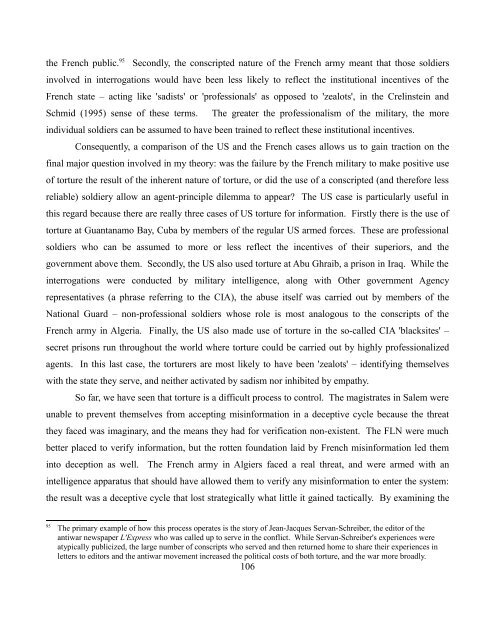The Torturer's Dilemma: Analyzing the Logic of Torture for Information
The Torturer's Dilemma: Analyzing the Logic of Torture for Information
The Torturer's Dilemma: Analyzing the Logic of Torture for Information
Create successful ePaper yourself
Turn your PDF publications into a flip-book with our unique Google optimized e-Paper software.
<strong>the</strong> French public. 95 Secondly, <strong>the</strong> conscripted nature <strong>of</strong> <strong>the</strong> French army meant that those soldiers<br />
involved in interrogations would have been less likely to reflect <strong>the</strong> institutional incentives <strong>of</strong> <strong>the</strong><br />
French state – acting like 'sadists' or 'pr<strong>of</strong>essionals' as opposed to 'zealots', in <strong>the</strong> Crelinstein and<br />
Schmid (1995) sense <strong>of</strong> <strong>the</strong>se terms. <strong>The</strong> greater <strong>the</strong> pr<strong>of</strong>essionalism <strong>of</strong> <strong>the</strong> military, <strong>the</strong> more<br />
individual soldiers can be assumed to have been trained to reflect <strong>the</strong>se institutional incentives.<br />
Consequently, a comparison <strong>of</strong> <strong>the</strong> US and <strong>the</strong> French cases allows us to gain traction on <strong>the</strong><br />
final major question involved in my <strong>the</strong>ory: was <strong>the</strong> failure by <strong>the</strong> French military to make positive use<br />
<strong>of</strong> torture <strong>the</strong> result <strong>of</strong> <strong>the</strong> inherent nature <strong>of</strong> torture, or did <strong>the</strong> use <strong>of</strong> a conscripted (and <strong>the</strong>re<strong>for</strong>e less<br />
reliable) soldiery allow an agent-principle dilemma to appear? <strong>The</strong> US case is particularly useful in<br />
this regard because <strong>the</strong>re are really three cases <strong>of</strong> US torture <strong>for</strong> in<strong>for</strong>mation. Firstly <strong>the</strong>re is <strong>the</strong> use <strong>of</strong><br />
torture at Guantanamo Bay, Cuba by members <strong>of</strong> <strong>the</strong> regular US armed <strong>for</strong>ces. <strong>The</strong>se are pr<strong>of</strong>essional<br />
soldiers who can be assumed to more or less reflect <strong>the</strong> incentives <strong>of</strong> <strong>the</strong>ir superiors, and <strong>the</strong><br />
government above <strong>the</strong>m. Secondly, <strong>the</strong> US also used torture at Abu Ghraib, a prison in Iraq. While <strong>the</strong><br />
interrogations were conducted by military intelligence, along with O<strong>the</strong>r government Agency<br />
representatives (a phrase referring to <strong>the</strong> CIA), <strong>the</strong> abuse itself was carried out by members <strong>of</strong> <strong>the</strong><br />
National Guard – non-pr<strong>of</strong>essional soldiers whose role is most analogous to <strong>the</strong> conscripts <strong>of</strong> <strong>the</strong><br />
French army in Algeria. Finally, <strong>the</strong> US also made use <strong>of</strong> torture in <strong>the</strong> so-called CIA 'blacksites' –<br />
secret prisons run throughout <strong>the</strong> world where torture could be carried out by highly pr<strong>of</strong>essionalized<br />
agents. In this last case, <strong>the</strong> torturers are most likely to have been 'zealots' – identifying <strong>the</strong>mselves<br />
with <strong>the</strong> state <strong>the</strong>y serve, and nei<strong>the</strong>r activated by sadism nor inhibited by empathy.<br />
So far, we have seen that torture is a difficult process to control. <strong>The</strong> magistrates in Salem were<br />
unable to prevent <strong>the</strong>mselves from accepting misin<strong>for</strong>mation in a deceptive cycle because <strong>the</strong> threat<br />
<strong>the</strong>y faced was imaginary, and <strong>the</strong> means <strong>the</strong>y had <strong>for</strong> verification non-existent. <strong>The</strong> FLN were much<br />
better placed to verify in<strong>for</strong>mation, but <strong>the</strong> rotten foundation laid by French misin<strong>for</strong>mation led <strong>the</strong>m<br />
into deception as well. <strong>The</strong> French army in Algiers faced a real threat, and were armed with an<br />
intelligence apparatus that should have allowed <strong>the</strong>m to verify any misin<strong>for</strong>mation to enter <strong>the</strong> system:<br />
<strong>the</strong> result was a deceptive cycle that lost strategically what little it gained tactically. By examining <strong>the</strong><br />
95 <strong>The</strong> primary example <strong>of</strong> how this process operates is <strong>the</strong> story <strong>of</strong> Jean-Jacques Servan-Schreiber, <strong>the</strong> editor <strong>of</strong> <strong>the</strong><br />
antiwar newspaper L'Express who was called up to serve in <strong>the</strong> conflict. While Servan-Schreiber's experiences were<br />
atypically publicized, <strong>the</strong> large number <strong>of</strong> conscripts who served and <strong>the</strong>n returned home to share <strong>the</strong>ir experiences in<br />
letters to editors and <strong>the</strong> antiwar movement increased <strong>the</strong> political costs <strong>of</strong> both torture, and <strong>the</strong> war more broadly.<br />
106
















